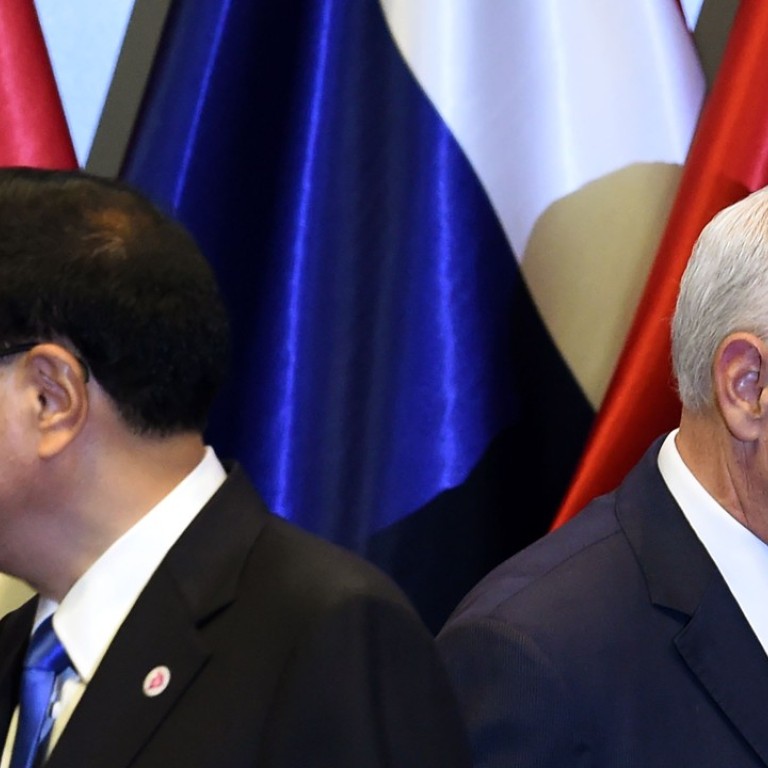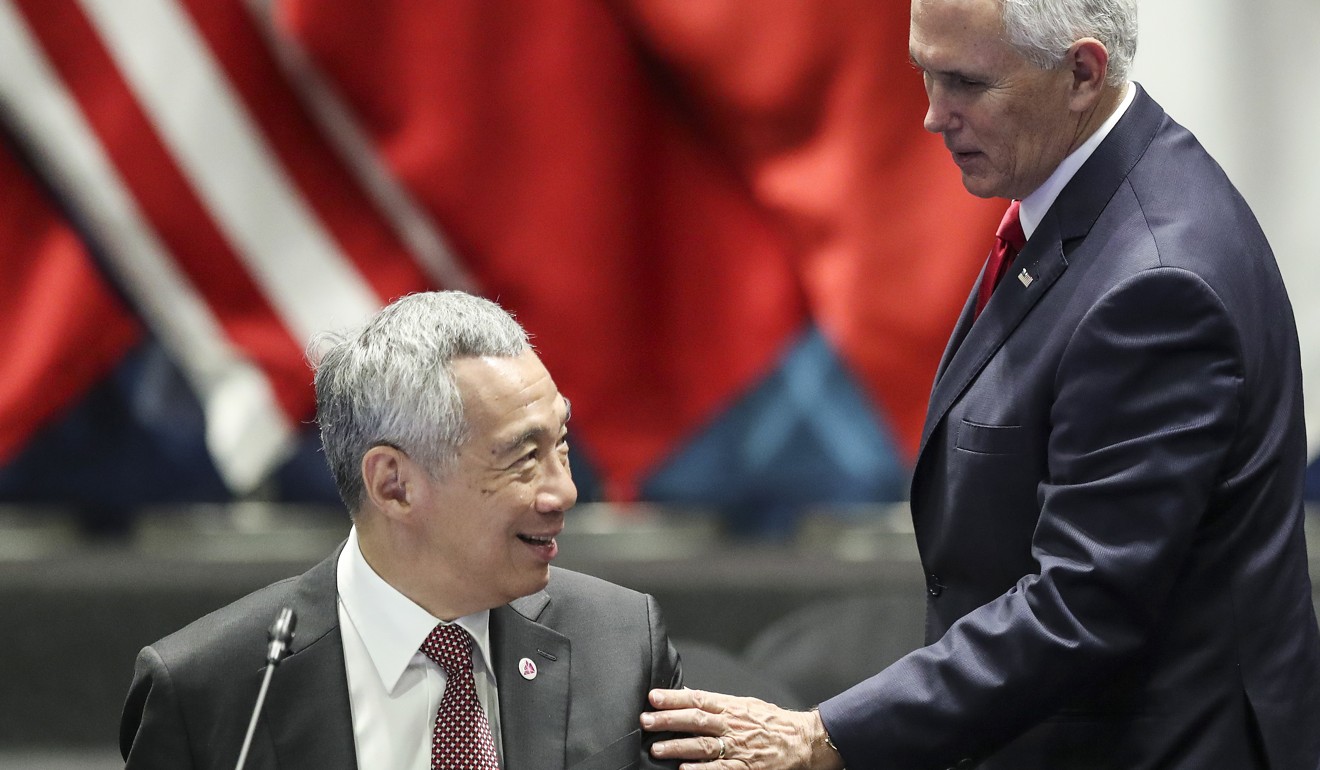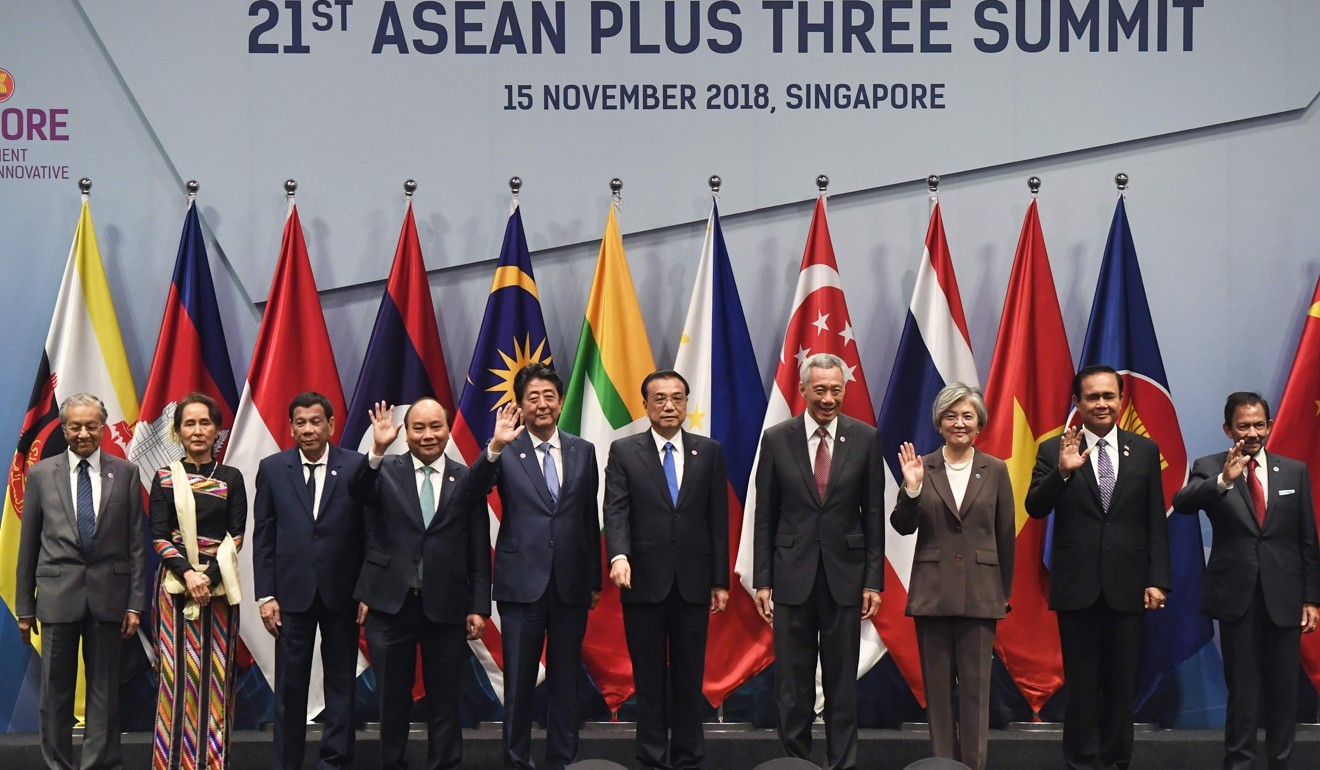
Singapore leader Lee Hsien Loong warns region may have to choose between China and US
- Prime minister says ‘circumstances may come when Asean may have to choose one or the other’ as he wraps up summit in city state
- US Vice-President Mike Pence tells gathering ‘we all agree that empire and aggression has no place in the Indo-Pacific’
Singapore’s Prime Minister Lee Hsien Loong on Thursday warned that Southeast Asian nations may be forced to choose between the rival visions of China and the United States, while US Vice-President Mike Pence said aggression should not be tolerated.
“If you are friends with two countries which are on different sides, sometimes it is possible to get along with both, sometimes it’s more awkward when you try to get along with both,” Lee said as he wrapped up the annual Association of Southeast Asian Nations summit.
“I think it’s very desirable for us not to have to take sides, but the circumstances may come when Asean may have to choose one or the other. I am hoping that it’s not coming soon.”
Lee’s remarks highlighted a deep sense of unease in the region, where concern is growing about being caught in the middle of escalating economic and security rivalry between the two powers.

US President Donald Trump’s absence from the two high-profile Asian summits this week – Asean and also Apec in Papua New Guinea – has raised questions as to America’s right to be a leader in the region, at a time when China is angling to supplant it.
But Pence said the US saw Asean as an “irreplaceable strategic partner”.
“Let me be clear, though: our vision for the Indo-Pacific excludes no nation. It only requires that nations treat their neighbours with respect, and respect the sovereignty of our nations and international rules and order.”
Is Donald Trump’s no-show at Asia summits a sign of waning US influence in region?
As Pence addressed the summit in Singapore, the US Navy said the Ronald Reagan Carrier Strike Group and the John C Stennis Carrier Strike Group were conducting warfare drills in the Philippine Sea to show America’s commitment to the region.
Beijing has long called US military activities in the region a threat to regional stability and, on some occasions, an infringement of its sovereignty.
Chinese Premier Li Keqiang attempted to reassure the country’s Southeast Asian neighbours about its rising power, saying Beijing was committed to finalising a code of conduct covering the disputed waters within three years.
Li also urged Asean members to work together to counter US trade policies and complete negotiations on the Regional Comprehensive Economic Partnership (RCEP) – a free-trade deal between the 10 members of Asean and six other Asia-Pacific nations.

China and the United States are expected to continue vying for influence at the Asia-Pacific Economic Cooperation summit in Papua New Guinea, which will hear from Pence and Chinese President Xi Jinping on Saturday.
Philippine President Rodrigo Duterte, who has taken a more relaxed stance on the country’s territorial claims in the South China Sea that rival Beijing’s, also said it was crucial that a code of conduct be completed to help prevent misunderstandings that could lead to conflict.
“China is there. That is the reality,” he said. “Strong military activity will prompt a response from China. I do not mind everybody going to war, but except that the Philippines is just beside those islands. If there is shooting there my country will be the first to suffer.”
What’s wrong with my nap? Philippine President Rodrigo Duterte defends missing Asean meetings for afternoon snooze
Lee, who chaired the Asean gathering, said he was confident the RCEP could be concluded next year, but was less optimistic about resolving disputes over the South China Sea.
“It will depend on issues that come up,” he said. “I am sure all the participants will show their best efforts in order to try and bring it to a conclusion. But I do not underestimate the complexity and the difficulty of the problems when it comes to the substance of the [code of conduct].”
Lee said that as China continued to expand its influence, both Beijing and the world would need to prepare for the changes to come.
“China’s impact on the rest of the world is considerable, and I think increasingly, it will become necessary for China to take into account its impact on the rest of the world – even while it is a developing country as it now is, as it is formulating its policies and … structuring its reforms,” he said.
The Singaporean leader also said the region would “have to get used to” a different US approach to its Asia policy. “They want to engage but they want to engage in a different way with much more emphasis on what they call a fair and reciprocal relationship,” Lee said.
Additional reporting by Associated Press

